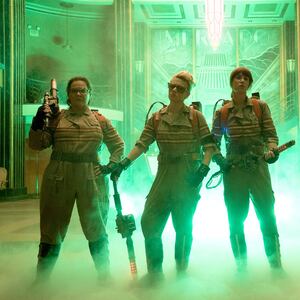Brie Larson’s casting as the superhero Captain Marvel sparked controversy from the start—though in 2016, among those familiar with the character, it was not because of the actress’ politics. It was her age. Carol Danvers’ rebranding from the swimsuit-clad Ms. Marvel to Captain Marvel in her 2012 solo comic book series had seemed to age the character’s appearance roughly into her mid-thirties. Larson, meanwhile, was only 26.
Debates about double standards in the Marvel Cinematic Universe—Robert Downey Jr. first played Iron Man well past 40 and will bow out at 53, yet some maintained that frequently fan-cast actresses like Emily Blunt or Katee Sackhoff might be too old for a decade-plus of blockbuster action—raged amid calls not to underestimate an Oscar-winning actress because of her youth.
That fervor soon passed. The MCU’s first solo female-led film had already been bumped twice from its originally announced July 2018 release date, and did not land its pair of directors, Anna Boden and Ryan Fleck, until two years ago. To the Carol Corps (the self-branded group of fans bonded through a love of Captain Marvel, identifiable at conventions and online by their knitted scarves, hats, and handmade merch), whether the movie would see the light of the day at all became a more pressing question than the actress’ age.
It helped that Larson’s persona, in the meantime, has become associated with celebrity acts of bravery. She famously refused to clap for accused sexual harasser Casey Affleck onstage at the Oscars, and became one of few actors to call for more diversity in the film press that covers their projects. On the eve of Captain Marvel’s release, longtime fans of the character and of the MCU generally seem fine with—if not outright charmed by—her. It’s not these fans' voices rising in hysteria over a manufactured controversy, determined to hijack an otherwise joyous cultural moment.
In the same style of harassment internet campaigns that have targeted women and minorities in video games, comics, and geek-branded film franchises like Ghostbusters and Star Wars, reactionary trolls have burped up a deluge of content targeting Larson and Captain Marvel in recent weeks. Most of it claims to be outraged over the notion that Larson hates white men, which is what someone might take from the following out-of-context quote by Larson if it were relayed through a 30-person game of telephone in which everyone has cotton balls stuffed in their mouths and is also mostly deaf:
“About a year ago, I started paying attention to what my press days looked like and the critics reviewing movies, and noticed it appeared to be overwhelmingly white male,” Larson told Marie Claire interviewer Keah Brown, a disabled journalist the actress handpicked for the gig. “So, I spoke to Dr. Stacy Smith at the USC Annenberg Inclusion Initiative, who put together a study to confirm that. Moving forward, I decided to make sure my press days were more inclusive. After speaking with you, the film critic Valerie Complex and a few other women of color, it sounded like across the board they weren’t getting the same opportunities as others. When I talked to the facilities that weren’t providing it, they all had different excuses.”
The quote was picked up by film sites last month and regurgitated under headlines that emphasized the words “white" and "male” rather than “inclusive,” priming men’s rights activists and so-called “incels” to mobilize online over an imagined slight. To them, a call for expanded access to opportunities for women and people of color in a space traditionally dominated by white men (like a Marvel film’s press junket) is not only an insult—it amounts to a threat to take away what they consider theirs. And at this point, five years after Gamergate established the playbook for how online harassment campaigns target those who advocate for diversity, websites and content creators have caught on, to their benefit.
Hence the page after page of search results for “Brie Larson” on YouTube, as journalists Matthew Yglesias and Ben Collins noted on Twitter, with titles like “Brie Larson is Ruining Marvel!” (eleven minutes long, 786,000 views) and “How Brie Larson Cost Marvel One Hundred Million Dollars” (20 minutes long, 1.6 million views, extremely faulty math). The latter calls Larson “the demise of entertainment,” a “loudmouth blonde-haired narcissist,” and “confused.” The former argues that one could actually mute a clip of Larson entirely and still glean her pure hatred toward white men: it’s in “that little head jerk” of hers, the video maintains. Tweets parroting this point abound.
Another video’s cover image features Larson in costume as Captain Marvel, with the words “Kill All Men!” typed across in yellow letters (269,000 views). All this to say nothing of the comment sections, or the genre of ten-minute-plus videos railing against Larson for not smiling in the movie’s first trailer. (She smiles and smirks and laughs quite a lot in the actual film, but what does that matter?) The toxic obsession with Larson extends to her Twitter mentions and Wikipedia page, where choice edits include: “She is also responsible for all the hate against upcoming Marvels [sic] movie ‘Captain Marvel’, cause she made made [sic] hate speech against all white man (in our culture if it was against all black man or women, it 100% would be a hate speech).”
Distortions of what Larson actually said to Marie Claire in the name of assuming victimhood for “all white man” also fuel a “boycott” of the film that hopes to pit it against another female-fronted action movie, Alita: Battle Angel. Alt-right conspiracy-peddler Jack Posobiec caught wind of the #AlitaChallenge within days: “We’re gonna stop giving money to people who hate us,” he declares in a video posted to Twitter, citing “Brie Larson and her little comments about how this movie isn’t for white males,” and listing the usual bullet points about “SJW bull crap” being “shoved” down delicate throats.
Backlash cycles against films like this feel almost rote in 2019, familiar down to the disingenuous talking points and tactics of oversensitive men threatened by blockbuster franchise leads who do not look like them. We’ve seen it with the all-female Ghostbusters, Ocean’s 8, Star Wars: The Last Jedi, and Black Panther. At least one favorite tool of anti-diversity reactionaries has been disrupted on this go-round, though: the Rotten Tomatoes audience score. The review aggregate site will no longer allow audiences (apart from critics, who make up the site’s “official” score) to review and rate films before their release.
The change came two weeks before Captain Marvel’s Friday debut but was not spurred specifically in response to it, according to the site’s president. (Prior to the change, Captain Marvel’s audience score had been dragged down to a 44 percent audience rating thanks to organized review-bombing campaigns.) “Unfortunately, we have seen an uptick in non-constructive input, sometimes bordering on trolling, which we believe is a disservice to our general readership,” a statement on the Rotten Tomatoes site reads. “Don’t worry though, fans will still get to have their say: Once a movie is released, audiences can leave a user rating and comments as they always have.” Still, angry men seized the occasion to cry censorship and post screenshots of themselves canceling ticket orders. “You can kiss my white, MALE ass,” wrote one.
While Rotten Tomatoes is doing what it can to keep such blind tantrums contained, other sites seem poised to capitalize. Editor and screenwriter Ashley Lynch notes on Twitter that in its review of Captain Marvel, trade publication The Hollywood Reporter affixed alt-right favorite terms like “SJW” and “NPC” (“non-player character,” a term borrowed from video games meant to insult someone who cannot think for themselves) as search tags. At the least, their inclusion marks an editor’s decision to include hate campaigning as part of the Captain Marvel narrative. At worst, it functions as an effort to bring in extra eyeballs by flagging the film and its actress as targets.
A movie like Captain Marvel, starring a pretty young woman who doesn’t care to make her opinions palatable to men, about a character more powerful than any in the MCU, was never going to sit well with the kind of superhero fan who’d tell a woman to smile more. Larson’s efforts to foster inclusion in film are a fig leaf for a movement grasping for any excuse to lash out. But the more I think about it, the more appropriate it feels that this Carol Danvers is in her twenties. Self-actualized young women unbothered by men with small minds and smaller hearts are our culture’s real-life obsession right now, too. And while the rest of us stew in the same tired discourse, they simply fly higher, further, faster.








